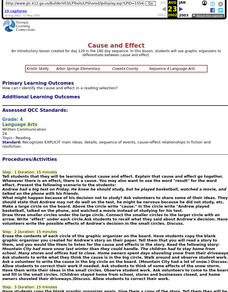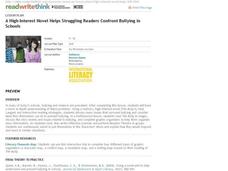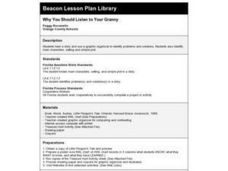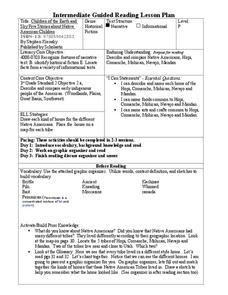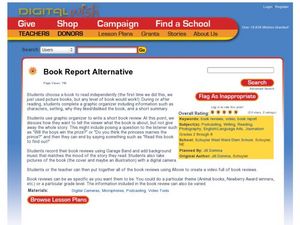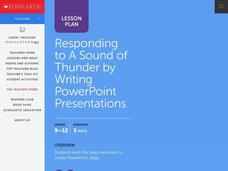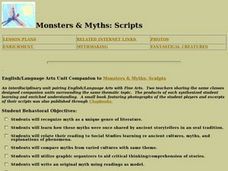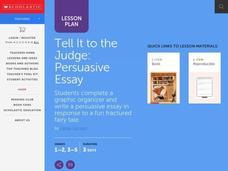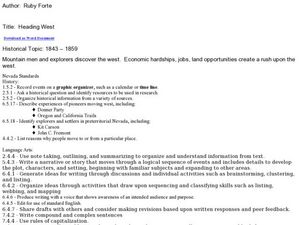Curated OER
Dig A Little Deeper
Here is a great lesson on recognizing events and themes in a story. Students read chapters from a chosen book and then fill out a graphic organizer to further explore the purpose of the chapter. They write the events, themes, author's...
Teacher's Corner
Is There a Wocket in my Pocket?
Accompany Dr. Seuss' Is There a Wocket in my Pocket? with this graphic organizer. Young readers make inferences about why the main character has certain feelings towards the creatures found in the story.
Curated OER
Creation Myths Data Chart
In this creation myth data chart worksheet, students share the titles of 3 why stories they read and think about how they are alike and different. The graphic organizer is used to enable students to collect data and share it easily with...
Curated OER
Getting to Know You
Pupils observe the teacher's basket which contains items that represent his/her childhood. They listen to a read aloud of Library Lil and complete a graphic organizer based on the story. They decorate a paper cut out with facts about a...
Curated OER
Cause and Effect
Fourth graders use graphic organizers to differentiate between cause and effect. They read a story independently and write the cause and effects in the graphic organizer.
Curated OER
Picture a Nation
Students research immigration data from a specific time period. They create a graphic organizer that depicts the information and share the information with the class.
ReadWriteThink
A High-Interest Novel Helps Struggling Readers Confront Bullying in Schools
Paul Langan's novel The Bully is the core text in a six-session unit plan that engages high schoolers in an in-depth examination of bullying and its effects on bullies, victims, and bystanders. The richly textured and carefully...
Curated OER
WHY YOU SHOULD LISTEN TO YOUR GRANNY
Students hear a story and use a graphic organizer to identify problems and solutions. They also identify main characters, setting and simple plot. They illustrate one situation when they should listen to their parents.
Curated OER
Plot/Story Problem/Resolution
Students analyze the plot, problem, and resolution of a story. In this story analysis lesson, students read stories and fill out graphic organizers about the plot, story problems, and resolution.
Curated OER
TELL THE SEQUENCE IN AN ORAL REPORT
Second graders survey a favorite story he/she has read or heard read aloud. They use the graphic organizer to draw illustrations that show the beginning, middle and end of the story. They tell the title of the story, whether it is...
Curated OER
Intermediate Guided Reading Lesson Plan
Third graders read Children of the Earth and Sky: Five Stories about Native American Children by Stephen Krensky. In this guided reading instructional activity, 3rd graders gain knowledge about various Native American tribes. Using a...
Curated OER
Very Good Facts About Very Good Books
Young scholars identify the characteristics of fiction and non-fiction texts. In this genre study lesson, students read the books A Butterfly Alphabet Book and I Wish I Were a Butterfly. Young scholars develop a graphic organizer to...
Curated OER
Book Report Alternative
Students create a video book report. In this literature lesson, students read a book independently and fill out a graphic organizer. Students use a digital camera to record their book review.
Curated OER
Character Analysis Lessons
Graphic organizers can be a great tool to help students understand character analysis.
Curated OER
Responding to A Sound of Thunder by Writing PowerPoint Presentations
High schoolers, after reading "A Sound of Thunder," create a PowerPoint presentation about time travel. They study and utilize a graphic organizer to assist them in preparing to deliver an oral presentation next and finally they print...
Curated OER
The Great Kapok Tree- Teaching About Conflict in Literature
Students identify the plot of a text. In this literature lesson plan, students listen to the book The Great Kapok Tree and identify the problem and solution. A graphic organizer is used to help reinforce the concept.
Curated OER
Monster and Myths: Scripts
Students explore characteristics of the myth genre. In this myth instructional activity, students become familiar with various myths and the cultures they were derived from. Students compare in a graphic...
Curated OER
Tell It to the Judge - Persuasive Essay
Students compare and contrast a classic fairy tale with a fractured one and complete a graphic organizer. Then they write a persuasive essay following the steps of the writing process. Finally, students publish their completed essay and...
Curated OER
Social Studies: Global Women and Poverty
Students conduct research and make comparisons about various global economies. Create graphic organizers to present their research findings and illustrate solutions to problems. Students discuss and debate issues based on what they have...
Curated OER
The Call of the Wild
Students read The Call of the Wild, noting its theme of survival. They investigate the book's concepts with word webs, spider maps, or graphic organizers. They conduct a panel discussion on dogs and wolves. They write a letter to the...
Curated OER
Wonder Wheels
Students discover ways that they all are alkie as well as different from each other. They write down three ways that students who cannot walk might be able to move around. Students complete a graphic organizer to analyze the immediate...
Curated OER
Heading West
Students study the concept of the westward expansion. In this exploration of the western U.S. lesson, students participate in different activities that explain economic hardships, jobs, and land opportunities. Students describe...
Curated OER
Teaching Lewis and Clark: Tribal Cultures and Homelands
Students examine the attributes of the tribes that inhabited the Columbia River Basin. In this Lewis and Clark instructional activity, students participate in a classroom simulation that requires them to participate in a seasonal round,...
Curated OER
Using Children's Literature to Teach Writing: No, David!
Students review beginning, middle, and end of a story and how details add to a story.




